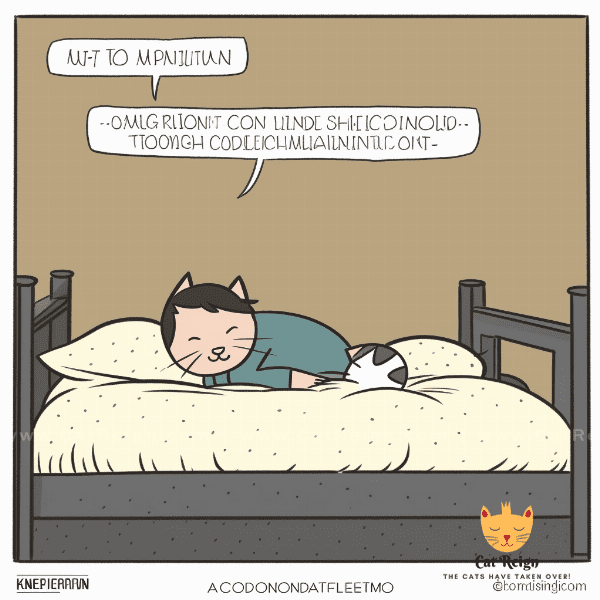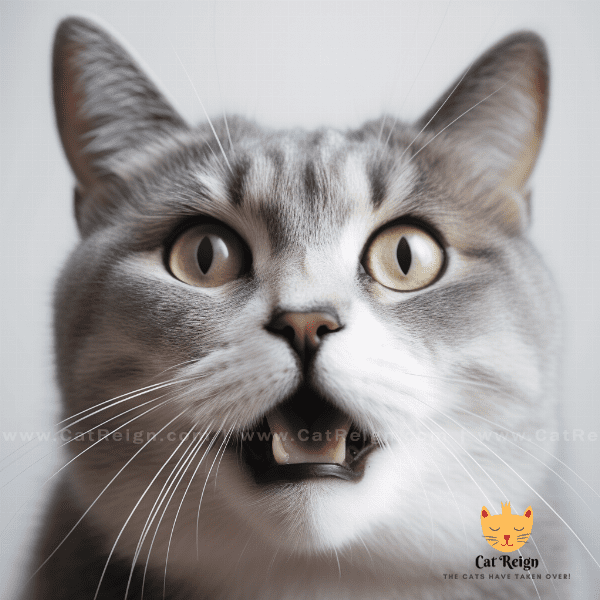Table of Contents
- Introduction to Cat Meowing at Night
- Reasons Why Cats Meow at Night
- Understanding Your Cat’s Behavior
- Tips to Stop Your Cat from Meowing at Night
- Importance of Addressing Nocturnal Cat Vocalization
- Common Myths About Cat Meowing at Night
- Seeking Professional Help for Your Cat’s Nocturnal Vocalization
- Using Positive Reinforcement to Modify Your Cat’s Behavior
- Creating a Comfortable Sleeping Environment for Your Cat
- Conclusion: Living in Harmony with Your Feline Friend at Night
Introduction to Cat Meowing at Night
As a cat owner, you may have experienced the disturbance of your feline friend’s nocturnal vocalization. Cats are known for their meows and purrs, but when they persistently meow at night, it can be frustrating and disruptive to your sleep routine.
Understanding why your cat meows at night is the first step in addressing this behavior. Some cats may meow because they are hungry, while others may do so out of boredom or anxiety. In some cases, it may be due to an underlying health issue that requires attention.
The Nature of Feline Nocturnal Vocalization
Cats are nocturnal animals, which means they are naturally more active during the night. This is a result of their hunting instincts, as many of their prey species are also active during the night.
While cats may sleep for several hours during the day, they may become more active at night and engage in behaviors such as hunting imaginary prey or scratching. They may also meow as a way of communicating with their owners, expressing their needs, or seeking attention.
The Impact of Cat Meowing at Night
Cat meowing at night can have a significant impact on both the cat owner and the cat’s well-being. Sleep deprivation due to persistent meowing can lead to increased stress, irritability, and decreased productivity. In addition, it may cause the cat to become anxious, which can further exacerbate their nocturnal vocalization.
In the next section, we will explore some of the reasons why cats meow at night and how to address this behavior.
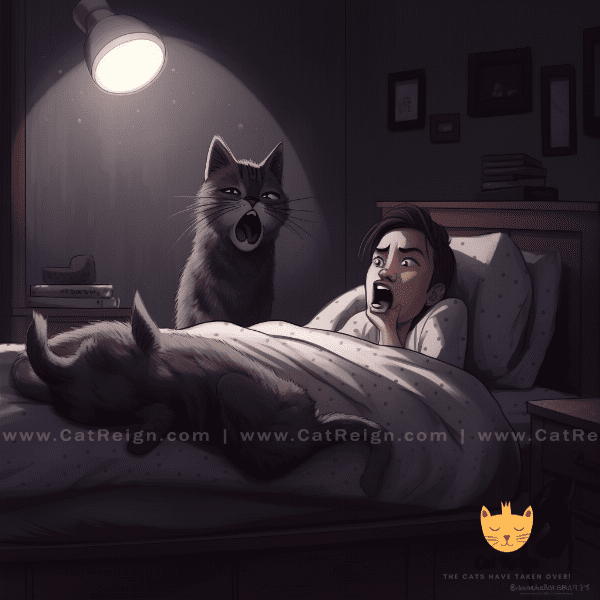
Reasons Why Cats Meow at Night
Cats may meow at night for a variety of reasons. In some cases, it may be due to hunger or thirst, while in others, it may be related to boredom or anxiety. Here are some of the common reasons why cats meow at night:
Hunger or Thirst
If your cat’s meowing is persistent and accompanied by begging for food or water, it may indicate that they are hungry or thirsty. To address this behavior, ensure that your cat is fed a balanced diet and has access to clean water throughout the day.
Seeking Attention
Cats are social creatures and may meow at night to seek attention from their owners. This behavior may be especially common if your cat is used to receiving attention during the day and feels neglected at night.
To address this behavior, make sure that you spend quality time with your cat during the day and provide them with interactive toys to keep them occupied at night.
Anxiety or Stress
Cats may meow at night due to anxiety or stress. This may be caused by changes in their environment or routine, such as moving to a new home or the introduction of a new pet.
To address this behavior, try to identify the source of your cat’s anxiety and provide them with a comfortable and familiar sleeping environment. You can also use pheromone sprays or diffusers to help calm your cat’s nerves.
.

Understanding Your Cat’s Behavior
Cats are complex creatures with unique personalities and behaviors. To effectively address your cat’s meowing at night, it is important to understand their behavior and what motivates them.
Body Language
Cats communicate not only through vocalization but also through body language. Paying attention to your cat’s body language can give you important insights into their emotional state and needs. For example, a tail held high indicates a friendly and confident cat, while a tail tucked between the legs suggests fear or anxiety.
Vocalization
While meowing is a common form of communication for cats, it is not the only one. Cats also communicate through purring, hissing, growling, and even chirping. Understanding the different types of vocalizations can help you determine what your cat is trying to communicate to you.
Individual Personality
Just like humans, each cat has its own unique personality and temperament. Some cats are more vocal than others and may meow at night simply because they enjoy vocalizing. Other cats may be more anxious or easily stressed, leading to more frequent meowing at night.
Environmental Factors
The environment in which your cat lives can also have a significant impact on their behavior. Changes to their environment or routine, such as the addition of a new pet or moving to a new home, can cause stress and anxiety in cats, leading to increased meowing at night.
By understanding your cat’s behavior and what motivates their meowing at night, you can take the necessary steps to address this behavior and improve your cat’s overall well-being. In the next section, we will explore some tips to stop your cat from meowing at night.

Tips to Stop Your Cat from Meowing at Night
If your cat’s meowing at night is causing disruption to your sleep routine, there are several strategies that you can use to address this behavior. Here are some tips to stop your cat from meowing at night:
Establish a Consistent Routine
Cats thrive on routine, and establishing a consistent daily routine can help reduce anxiety and stress that may be causing your cat to meow at night. This includes feeding, playing, and sleeping at the same times each day.
Provide Adequate Stimulation
Cats need mental and physical stimulation to remain happy and healthy. Providing your cat with interactive toys and playtime during the day can help tire them out and reduce their need to meow at night.
Create a Comfortable Sleeping Environment
Cats need a comfortable and familiar sleeping environment to feel safe and secure. Providing your cat with a comfortable bed in a quiet, dark room can help reduce their meowing at night.
Use Positive Reinforcement
Positive reinforcement can be an effective way to modify your cat’s behavior. This involves rewarding your cat for positive behaviors, such as quiet and calm behavior at night, with treats or praise.
Seek Professional Help
If your cat’s meowing at night persists despite your best efforts, it may be necessary to seek professional help. Your veterinarian can help rule out any underlying medical conditions and may refer you to a cat behaviorist who can provide additional strategies to address this behavior.
By using these tips, you can effectively stop your cat from meowing at night and improve both your cat’s and your own quality of sleep. In the next section, we will explore the importance of addressing nocturnal cat vocalization and the impact it can have on your cat’s health.

Importance of Addressing Nocturnal Cat Vocalization
While some cat owners may see their cat’s meowing at night as a harmless behavior, it is important to address this behavior for the health and well-being of both the cat and the owner.
Sleep Deprivation
Persistent meowing at night can lead to sleep deprivation for both the cat owner and the cat itself. Lack of sleep can cause a range of health issues for both humans and cats, including increased stress, anxiety, and decreased productivity.
Impact on the Cat’s Health
Cat meowing at night can negatively impact the cat’s health, both physically and mentally. Disrupted sleep patterns can lead to weight gain or loss, as well as other health issues related to stress and anxiety.
Behavioral Issues
If left unaddressed, cat meowing at night can lead to other behavioral issues in cats, such as aggression, destructive behavior, and litter box issues. These behaviors can be difficult to address and may require professional help.
Importance of a Healthy Relationship
Cats are social creatures and rely on their relationship with their owner for their physical and emotional well-being. Addressing nocturnal cat vocalization is an important step in maintaining a healthy relationship between the cat and the owner.
By addressing your cat’s meowing at night, you can improve both your cat’s and your own quality of life. In the next section, we will explore common myths about cat meowing at night and dispel some misconceptions about this behavior.
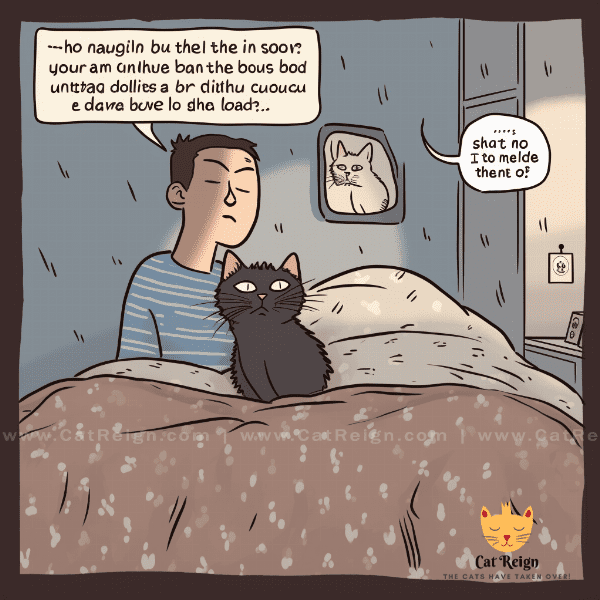
Common Myths About Cat Meowing at Night
There are several myths surrounding cat meowing at night that can lead to misunderstandings about this behavior. Let’s dispel some of these myths and set the record straight.
Myth: Cats Meow at Night Because They Are Lonely
While cats are social creatures, meowing at night is not always a sign of loneliness. Cats may meow at night for a variety of reasons, including hunger, thirst, boredom, or anxiety.
Myth: Cats Will Eventually Stop Meowing at Night
While some cats may stop meowing at night on their own, others may persist in this behavior. It is important to address this behavior to improve both your cat’s and your own quality of life.
Myth: All Cats Meow at Night
Not all cats meow at night, and the frequency and intensity of nocturnal vocalization can vary widely between individual cats. It is important to understand your cat’s behavior and what motivates their meowing at night to effectively address this behavior.
Myth: Meowing at Night is a Sign of a Bad Cat
Meowing at night is a natural behavior for cats and does not necessarily indicate that a cat is bad or poorly behaved. By understanding your cat’s behavior and addressing their meowing at night, you can improve your cat’s behavior and strengthen your relationship with your feline friend.
By dispelling these common myths about cat meowing at night, we can better understand and address this behavior in our feline companions. In the next section, we will explore seeking professional help for your cat’s nocturnal vocalization.
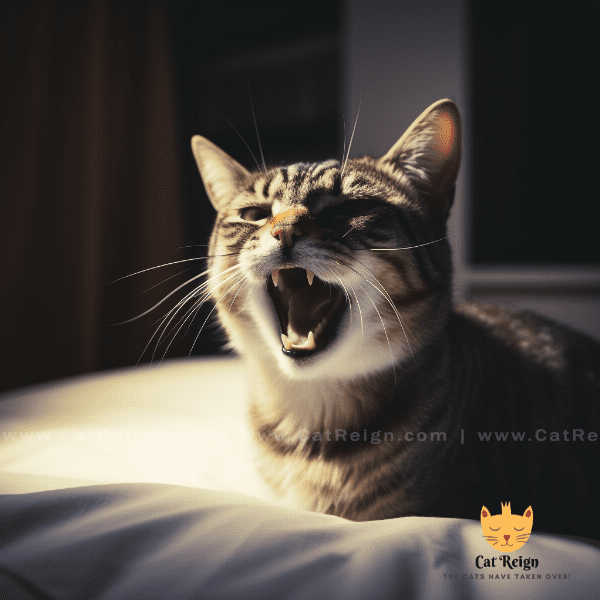
Seeking Professional Help for Your Cat’s Nocturnal Vocalization
If your cat’s meowing at night persists despite your best efforts, it may be necessary to seek professional help. Here are some reasons why you may want to consider seeking professional help for your cat’s nocturnal vocalization:
Underlying Health Issues
Cat meowing at night may be related to underlying health issues such as hyperthyroidism, kidney disease, or cognitive dysfunction. A veterinarian can help rule out any medical conditions that may be contributing to your cat’s meowing at night.
Cat Behaviorist
A cat behaviorist can provide additional strategies to address your cat’s meowing at night. They can help identify the root cause of the behavior and provide customized recommendations based on your cat’s individual personality and needs.
Medication
In some cases, medication may be necessary to address your cat’s meowing at night. A veterinarian can prescribe medication to help alleviate anxiety and stress that may be contributing to the behavior.
By seeking professional help, you can get to the root of your cat’s meowing at night and address the behavior effectively. Remember that addressing this behavior is important for both your cat’s and your own quality of life.
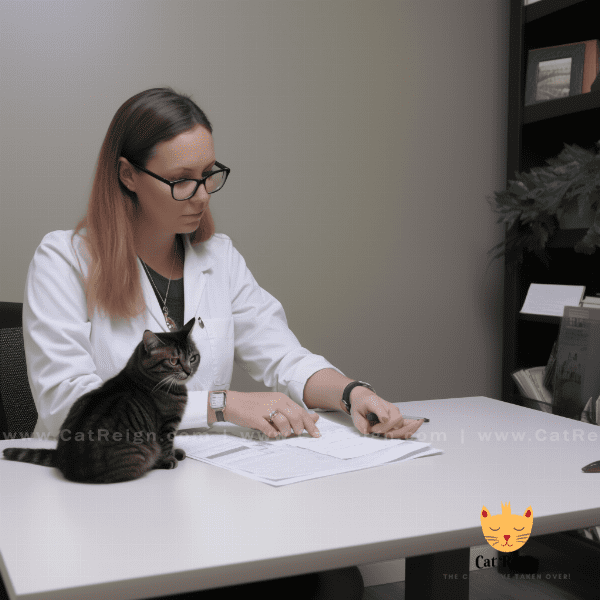
Using Positive Reinforcement to Modify Your Cat’s Behavior
Positive reinforcement is a powerful tool that can be used to modify your cat’s behavior. Here are some tips on how to use positive reinforcement to encourage calm and quiet behavior at night:
Reward Quiet Behavior
When your cat is calm and quiet at night, reward them with treats or praise. This will reinforce the behavior and encourage them to continue behaving calmly at night.
Create a Positive Sleeping Environment
Creating a comfortable and familiar sleeping environment for your cat can also encourage calm and quiet behavior at night. Provide your cat with a comfortable bed in a quiet, dark room and consider using pheromone sprays or diffusers to help calm their nerves.
Use Interactive Toys
Interactive toys can help tire your cat out and reduce their need to meow at night. Use toys that allow your cat to play independently, such as puzzle feeders or self-play toys.
Be Consistent
Consistency is key when using positive reinforcement to modify your cat’s behavior. Reward quiet behavior consistently and avoid rewarding meowing or other disruptive behavior.
By using positive reinforcement to encourage calm and quiet behavior at night, you can effectively modify your cat’s behavior and improve both your cat’s and your own quality of life. Remember that addressing your cat’s meowing at night is important for their health and well-being, and seeking professional help may be necessary if the behavior persists.

Creating a Comfortable Sleeping Environment for Your Cat
Creating a comfortable sleeping environment is important for your cat’s overall health and well-being, and can also help reduce their meowing at night. Here are some tips on how to create a comfortable sleeping environment for your cat:
Provide a Cozy Bed
Provide your cat with a comfortable and cozy bed to sleep in. Choose a bed that is the right size for your cat and made from soft, comfortable materials.
Choose a Quiet Location
Choose a quiet location for your cat’s sleeping area. Avoid placing their bed in a high-traffic area or near noisy appliances.
Keep it Dark
Cats are naturally nocturnal creatures and prefer to sleep in dark environments. Use blackout curtains or blinds to keep your cat’s sleeping area dark and quiet.
Use Pheromone Sprays or Diffusers
Pheromone sprays or diffusers can help create a calming environment for your cat. These products mimic the natural pheromones that cats release when they feel safe and secure, helping to reduce anxiety and stress.
Keep it Clean
Regularly clean your cat’s sleeping area to keep it free of dirt, dust, and allergens. This will help your cat sleep more comfortably and reduce the risk of respiratory issues.
By creating a comfortable sleeping environment for your cat, you can help reduce their meowing at night and improve their overall health and well-being. Remember to also establish a consistent routine and provide adequate mental and physical stimulation to help tire your cat out and encourage calm and quiet behavior at night.

Conclusion: Living in Harmony with Your Feline Friend at Night
Living in harmony with your feline friend at night is important for both your cat’s and your own quality of life. By understanding why cats meow at night and addressing this behavior effectively, you can improve your cat’s health and well-being, as well as your own.
- Cat meowing at night can be caused by a variety of factors, including hunger, thirst, anxiety, or boredom.
- Creating a comfortable sleeping environment for your cat and establishing a consistent routine can help reduce meowing at night.
- Positive reinforcement can be an effective way to modify your cat’s behavior, while punishment should be avoided.
- Seeking professional help may be necessary if your cat’s meowing at night persists.
- Creating a harmonious living environment with your cat at night is important for both your cat’s and your own health and well-being.
Remember to be patient and consistent when addressing your cat’s meowing at night. With time, effort, and the right strategies, you can live in harmony with your feline friend at night and enjoy restful, peaceful sleep.
